- Home
- Carrie Ryan
The Dead and Empty World Page 3
The Dead and Empty World Read online
Page 3
No one answers, which doesn’t surprise her.
“I’ve got the place trapped,” she calls out again. “You try coming inside and you might as well go blow your own head off.”
Another lie— but nothing whoever or whatever is out there needs to know.
“Find anything?” Sally asks when Margie gets back inside.
“Skunk,” Margie mutters. “Don’t go out there stumbling around until I find him,” Margie warns. “We don’t need to smell things up again.”
Sally crinkles her nose. Dirt mingles indistinguishably with freckles along the bridge. She yawns, long and loud.
“Bedtime,” Margie says, pushing Sally toward the rope ladder up to the loft.
Once they’re both curled up on the wide bed with just a sheet pulled over them, Margie says, “Tell me about this trip we’re taking through West Virginia.”
“There’s this place there called the Paw Paw Tunnel— it took them more than a decade to dig,” Sally starts to tell her. “First we’ll have to stop by the town and eat at this place on a hill called Panorama at the Peak. It’ll be a long walk from there to the tunnel, but the travel book says it’s a must if you’re visiting the area.”
Margie closes her eyes. Her little sister smells like sweat and unwashed hair, but it’s a sweet smell, familiar and steadying. Margie tries to sleep— she wants to sleep— but instead she just counts heartbeats. Outside it begins to rain, thunder tripping through the valleys around them. Sally’s breathing falls into a steady rhythm, and in between lightning strikes all Margie can think about is someone being outside. Right now. Watching their little cabin.
She sneaks back down the ladder and crouches by the window, looking out at the clearing surrounding the house. Rain courses from the sky— a curtain of water blocking the outside world.
The storm rolls closer, lightning and thunder wrapping around each other and pummeling the mountain. In the bare seconds of light, Margie scours the clearing around the cabin, terrified of seeing something out there that doesn’t belong.
Eventually, when her legs fall numb, she moves to the table, where the flashes of lightning illuminate the atlas and tattered notebook. The change time came when Sally was in third grade and Margie in tenth. Her sister’s handwriting is stiff and careful, the letters showing the unsteadiness of her little hand as if she’s still stuck in the before time that happened years ago.
Margie flips through the book: page after page of adventures and plans. Details of a path across the entire continent, as far as their maps can take them. It’s to be the grandest road trip ever, according to Sally.
Margie wonders when Sally will figure it all out. Figure out the truth of their life.
Because it’s the end of summer, another big thunderstorm rolls into the valley the next afternoon. The sky glows a sickening green, and nothing feels right to Margie. Heat settles thick and humid, the wind holding its breath before the storm pushes in hard. Sally seems oblivious, sorting through the guidebooks, flipping through the pages with an almost manic intensity.
“Whatcha looking for?” Margie asks. She crouches next to her sister but keeps glancing out the window. The air’s so saturated it’s hard to see much farther than the porch.
“West Virginia.” Her voice comes out almost breathless, that kind of sound you get on the edge of panic. “I can’t find West Virginia. We haven’t finished the route through, and I need to find someplace where we can stay the second night or we’ll be trapped outside.”
She looks up at her older sister with eyes wide and wet. “We can’t be outside, Margie,” she whispers harshly. “We have to be inside where it’s safe, and I can’t find the book of inns and hotels.”
“It’s okay.” Margie lays a hand on her sister’s shoulder, but she shrugs it away. “We had it last night. It’s here.”
“It’s not here!” Sally cries, shaking her head. “It’s not here,” she says again.
“We’ll keep looking,” Margie reassures her. Beyond the window the storm finally hits, wind hissing and rain bending trees to the ground.
Margie convinces Sally to skip West Virginia for now and figure out where they should stop in Maryland. “I’ve always heard they have great crab cakes there,” Margie says. She finds the Maryland guidebook and sets it on the table.
The picture on the cover shows a faded blue bay and white sails, with a red crab bursting from the text. It makes Margie ache for something she’s tried to give up. It makes her feel lonely in a way she hasn’t before— an intense desire to share something as simple as a chair by the water with someone who understands.
Sally keeps her head bowed low over the map, stringy tips of her hair brushing the crinkled pages. “After that we’ll go to Maine. It’ll be safer up north in the winter,” she says without looking up. “They don’t move as much in the cold.”
Margie presses her lips together tight. She remembers planning vacations that didn’t revolve around monsters. When snow meant sledding and snowmobiles and fun. The aching part inside her wells deep, spreading fast and hard through her— pounding in her blood.
“Right,” she finally says. “That’s right.”
She leaves Sally sitting at the table and steps out onto the porch, where the rain beats against the ground as if to punish it. In two steps Margie’s deluged, letting the heavy drops sting her skin and mix with her tears. She feels helpless under this weight of water. The world’s too big for her to survive in, much less for her to keep another being safe.
She knows a day will come when it’s too much. When she’ll trip up and miss a sign or signal, and that will be the end of that. She feels like a windup clock—and now she’s winding down and doesn’t know what to do next, how to twist herself back up again to keep on going.
The storm shifts and the wind howls like the dead. They’re out there, she knows, climbing the mountain, pushing at the circle of laurel, tripping over strings of tins cans that beat and rattle in the storm.
Eventually this tiny fortress will no longer keep them safe. She’ll have to tell Sally to plan the next trip, and they’ll move on, and the clock will keep ticking until the gears wind down to nothing.
Margie climbs back onto the porch, every bit of her body soaked and cold with rain. Just as she reaches for the door, the glint of light off water makes her pause.
There’s a puddle at the end of the porch with two ovals of mud dissolving in the middle, the edges blurring and washing away. A strip of damp leads up the wall, as if someone in dirty shoes recently stood there, leaning against the cabin.
Margie’s throat closes. Her body jerks rigid. Behind her the storm menaces —howling and beating and breaking. It’s as if the entire world’s turning inside out, the cacophony of the mountain splitting apart.
She turns around. The sky’s dark, everything that color of deep dusk, when shapes bleed into each other and your eyes play tricks. Movement hums around her but always out of sight. Her teeth chatter as she forces air into her lungs, willing everything to just shut up a moment so she can figure out what’s going on.
She waits for someone to burst out of the rain. To throw her against the wall and attack her in the way of men or monsters or both. A thin thread of light from inside cuts across the porch, dissolving into the storm. Through it she watches individual drops of rain plummet and splatter, running together over and around the cabin.
Every muscle in her body tight and trembling, she slips into the cabin and wraps her hands around the shotgun, its weight a comfort. She carries the lantern from room to room, listening for a sound out of place under the beating of the storm. Everywhere’s empty, just the way it should be, but she leaves the lantern burning on the table because she can’t bear the dark.
Tucking the gun under her arm, she climbs up to the loft and pulls the rope ladder after her. Sally’s been in bed long enough that she already sleeps deep and even, her breathing a syncopated hiss mixing with the storm. Margie spends the night pressed against the wall, st
aring out the windows to the clearing around the cabin. Tiny squares of light spill from downstairs, flickering like fire against the darkness.
The storm clears before dawn and, exhausted, Margie sneaks back onto the porch. She’s almost convinced herself she dreamed the puddles— of course no one had been there, of course it was just the rain collecting under the eaves. The cabin’s old, the gutters unrepaired.
There are a million explanations for what she saw the night before. Margie’s just about convinced herself of all of them as birds wake up around her and start calling to the day.
But then she sees the book. It lies on its spine, flipped open to the middle, pages fluttering in the remnant wind. When she picks it up, the cover curls a bit and wet fingerprints smudge some of the corners. It’s the Visitor’s Guide to West Virginia.
“Found your book.” Margie tosses it onto the table, causing one of the chipped plates to rattle. “You should be more careful with it— if it hadn’t been tucked behind one of the planters on the porch, it would have gotten soaked,” Margie adds.
Sally looks up at her, lips stained dark with juice. “I didn’t take it outside, duh.”
Margie stands at the sink and looks out the window. She loves her sister, knows she’s probably right. But she has to believe Sally’s lying because otherwise someone came into the cabin and took the book. Someone stood leaning against the wall, flipping through pages while Sally and Margie sat inside, oblivious.
Her fingernails scratch against the old dingy grout of the tiled kitchen counter. This cabin’s the safest they’ve found since the change time. They’ve built a quasi-life here perched on the tip of a steep mountain. Margie’s garden is coming in, she has supplies enough to can and pickle, and the well has a hand pump so they don’t have to worry about water.
Though she lets Sally plan road trips in the evenings, Margie’s indulged herself with the idea of staying for a while. Settling in further. Spending the winter beside the fire quilting. Simple things you don’t dare dream about while the dead rumble around you.
Margie’s shoulders sag. Whoever’s out there hasn’t hurt them. Not yet. But if there’s anything Margie’s learned about the world since it changed, it’s that it’s only a matter of time.
She’s learned that lesson well.
“I’m going to check on the laurel walls.” Margie shoves a water bottle into a ragged backpack with extra shells and a plastic yellow flashlight. “It might take me a while. You going to be okay without me here?”
Sally lies on her back on the leather couch, an old paperback romance held above her head.
“I’m not a baby anymore, you know.” She says it slow and even. “I can tell there’s something going on. You’re not as good at hiding it from me as you think.”
Margie looks at the baby fat still visible under the smooth planes of her sister’s face. “It’s nothing,” she says.
Sally rolls her eyes. “Whatever.”
Margie isn’t lying about checking the perimeter, but that only takes an hour and then she finds a thick copse of weeds where she has a clear view of the cabin. Bugs swirl around her, creeping along her neck and tangling in her lashes, but she sits calm and still through dusk and into the late evening.
Through the window she watches her sister fix something to eat and flip through the atlas listlessly before selecting another novel and carrying it up to the loft. The lantern burns inside, beckoning to Margie, but she keeps to the weeds, waiting while stars begin to catch fire overhead.
He comes a few hours after nightfall, just as the moon burns a bright halo on the horizon. He creeps up the steps and eases into the swing, gripping the rusted chain to keep it from creaking. The ax he’d been carrying lies forgotten against the railing as if he’s not afraid of anyone or anything out here.
None of her traps signaled his approach, and Margie wonders just how many times he’s circumvented their defenses. She watches him a moment; it’s been so long since she’s seen a living human being other than her sister that she’s fascinated, even if this guy’s some sort of creeper who’s been in their cabin and touched their things. He hunches over himself so that most of him’s hidden in shadows, and she can’t get a good look at him except to tell that his hair’s tattered and his clothes ragged along the edges.
He jumps up as she steps from the weeds, but he doesn’t move for his ax. His body’s pole-bean thin, but even so she notices coiled muscles twined around his bare arms and knows he’s strong. She figures he’s her age or a little older.
“Just in case you can’t see out here,” she says, even and strong, “I’ve got a shotgun aimed at your gut. I wouldn’t reach for that ax.” Margie walks into the clearing, toes hitting the ground before she rocks onto her heels. She listens for movement just in case the boy isn’t alone, but she hears nothing but the night bugs screaming.
The boy raises his hands. “I’m not planning on doing anything stupid,” he says.
Margie swallows. She feels off balance inside, not really knowing what to do next. “Who are you and what do you want?”
“My name’s Calvin. I’m here because . . .” He looks down at his feet. He wears old yellow boots with knots in the laces holding them together. He shrugs. “I saw the light and I just . . .” He twists his face like it hurts him to say it. Then he looks up like he can see her in the darkness.
“I was lonely, okay?” He sounds defensive, his shoulders hitched forward.
The words cut into Margie— she doesn’t know what to do with them. “Where’d you come from?” she finally asks.
He shrugs. “Around. Here and there.”
Margie watches him, the slow rise and fall of his chest. He doesn’t seem as scared as he should with a gun pointed at him. “You know I don’t trust you, right? And I’m not going to trust you?”
He nods.
“Kick your ax off the porch,” she tells him. “And if you’ve got any other weapons, toss them too.”
Calvin reaches out with his toe and nudges the ax until it slips under the railing into the overgrown bushes. From his pockets he pulls two knives and a bag of bullets but no gun— they’ve become too scarce in the past years.
Margie keeps the shotgun on him as she climbs the steps. For a while they stare at each other, her trying to put the piece of his existence into the puzzle of her life up here.
“What’s it like back down the mountain?” Margie finally asks.
Calvin doesn’t hesitate. “Horrible.” He slumps into the swing. “There aren’t a lot of safe places left, and finding food’s impossible.” He stares at his hands, his elbows propped on his knees. There’s dirt under his nails and filling the cracks of his skin.
They sit like that for a bit, nothing of the world between them that’s the same except for the monsters. Margie thinks about what it was like before the big change, when you could talk about things like movies or television or some funny joke from the internet. She grapples for some sort of bridge she could pull between them so that the gap across the porch wouldn’t seem so big and wide.
“I can’t let you leave,” she finally says. “You know that, right? I don’t want you sneaking around out here and, even if you left, I can’t have you mention to someone out there that we’ve found a safe place.”
He nods his head. “I was hoping maybe if I promised not to tell anyone . . .” He looks at her and sees that she’s not the kind to offer false hopes to strangers. His face falls. “I understand.”
“I can tie you up on the porch or inside— I’ll give you that option.”
He looks through the window at the lantern spilling over the atlas and guidebooks. “Why West Virginia?” he finally asks.
Margie rubs her fingers along the stock of the shotgun, tracing the edge of the trigger. She still has the safety on, but he doesn’t know that. “My sister gets to choose where we go and she remembered some show about West Virginia.”
“It’s a nice place,” he says. “Prettier than you’d think.”
>
“You’ve been?”
“Yeah. Before. My family used to go camping up on the Cacapon in the spring.” He no longer looks at his hands but at her. She’s tucked into the darkness, but still there’s something about the way he sees her that makes her feel a sort of intimacy.
“I’ll get the rope,” she says, because she doesn’t want to talk about families or vacations or the time before.
“There’s a guy tied to the porch swing,” Sally says when Margie comes down from the loft in the morning. Margie watches as Calvin slowly rocks outside, his wrists still lashed to the chains.
“You know you’re terrible at knots, right?” Sally says, flipping through one of the guidebooks spread around her. “He could have gotten out easy if he’d wanted.”
She traces an interstate across the mountains on the map, cross-referencing a set of directions in her notebook. “Don’t know why he wouldn’t just escape if he had the chance,” she mumbles without looking up at her older sister.
Margie stares at Calvin. “Me neither.”
Margie pats him down to make sure there aren’t any more weapons tucked in his clothes, and then all three of them go to pick berries. Sally pesters Calvin about where he’s been and what the mountains out West are like compared to those in the East. Calvin’s patient and kind and always aware of the fact that Margie has a gun and is willing to blow some part of his body off at the slightest provocation.
Days pass one after the other: gardening and taking care of the cabin in the day, Calvin tied up at night, time rolling after time as the great clock unwinds.
“She knows the trip is a lie,” Calvin finally says one night as Margie wraps rope around his arm and the swing. She hesitates. “She knows more than you think. About the world. About what your chances of survival are.” He pauses. Her face isn’t far from his, and she smells the berry sweetness of his breath.

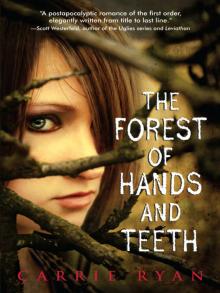 The Forest of Hands and Teeth
The Forest of Hands and Teeth Daughter of Deep Silence
Daughter of Deep Silence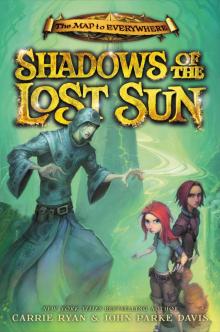 Shadows of the Lost Sun
Shadows of the Lost Sun Flotsam & Jetsam
Flotsam & Jetsam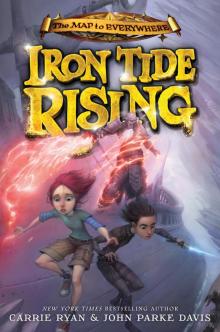 Iron Tide Rising
Iron Tide Rising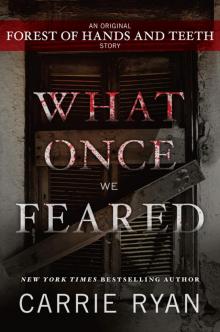 What Once We Feared
What Once We Feared Bougainvillea
Bougainvillea The Dead-Tossed Waves
The Dead-Tossed Waves Divide and Conquer
Divide and Conquer City of Thirst
City of Thirst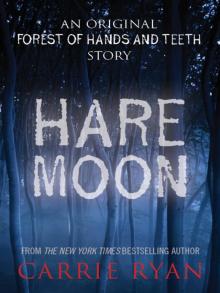 Hare Moon
Hare Moon Foretold: 14 Tales of Prophecy and Prediction
Foretold: 14 Tales of Prophecy and Prediction The Dark and Hollow Places
The Dark and Hollow Places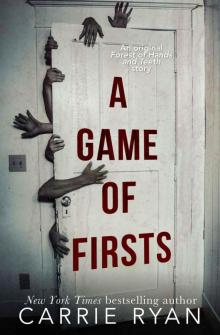 A Game of Firsts (The Forest of Hands and Teeth)
A Game of Firsts (The Forest of Hands and Teeth)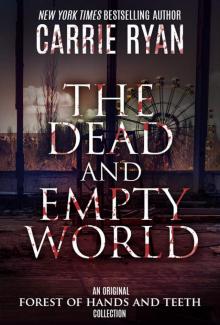 The Dead and Empty World
The Dead and Empty World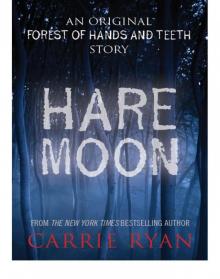 Forest SS - Hare Moon
Forest SS - Hare Moon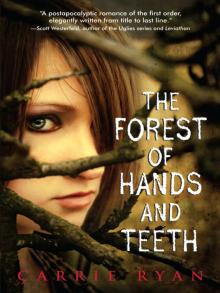 The Forest of Hands and Teeth Book 1
The Forest of Hands and Teeth Book 1 Foretold
Foretold